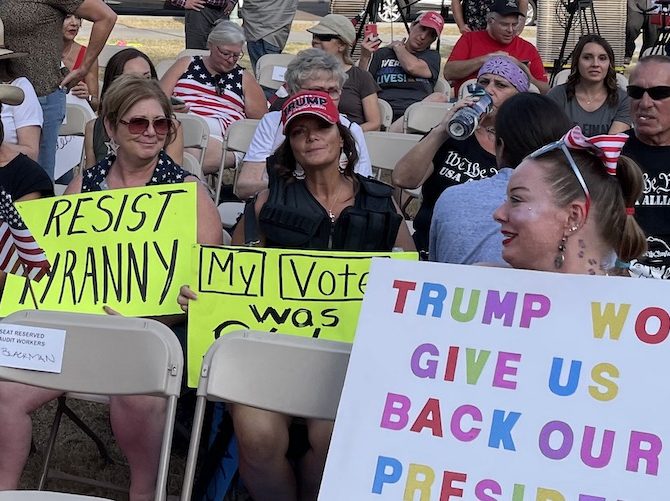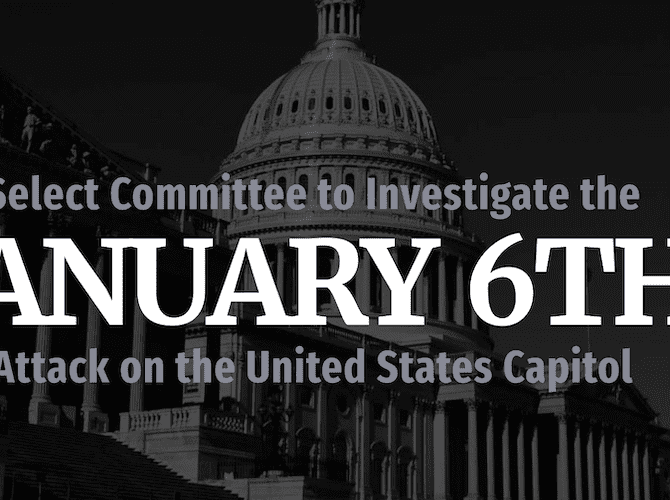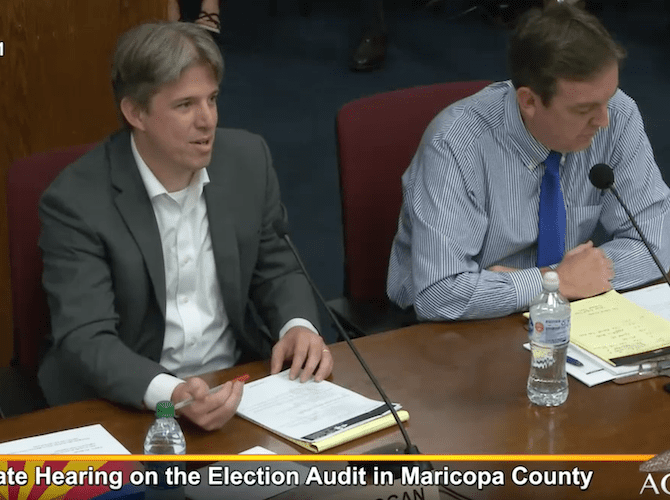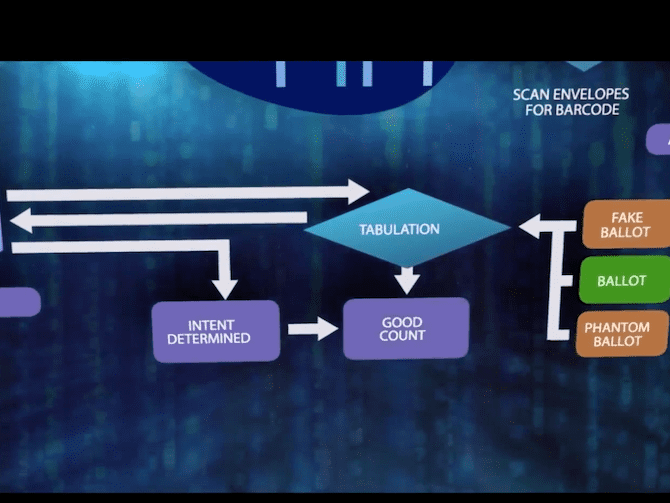Behind Proud Boys’ January 6 Attack is ‘Great Replacement’ Theory, Senate Told
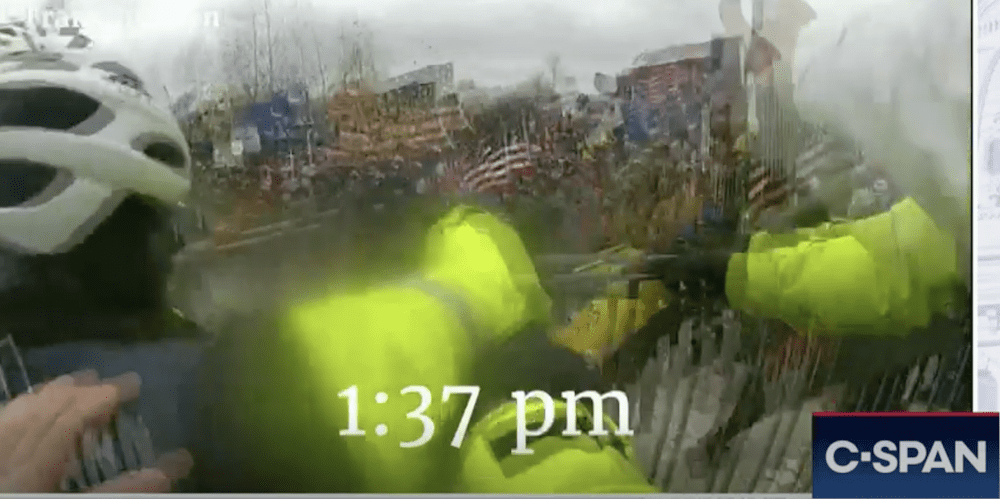
(January 6 insurrection at U.S Capitol. Image: www.c-span.org/video)
During Donald Trump’s presidency, the Proud Boys stood out as street brawlers in the right wing’s culture war. They attacked protesters who criticized police for killing innocent people of color. They picked fights over the dismantling of Confederate statues. But during the opening hearing by the House Select Committee to Investigate the January 6 Attack on the U.S. Capitol, they emerged in a new role, a front guard that attacked police and breached the Capitol.
Earlier on June 9, there was another hearing in Congress that concerned white supremacists like the Proud Boys. The Senate Homeland Security and Governmental Affairs Committee took testimony about “Domestic Extremism in America: Examining White Supremacist Violence in the Wake of Recent Attacks.” Among other things, the senators present, mostly Democrats, learned the FBI and Department of Homeland Security had not been compiling incidents of white supremacist violence.
One expert witness who has been tracking and working to stem white supremacy for decades, Eric Ward, executive director of the Western States Center and a senior fellow at the Southern Poverty Law Center, had a different message. He explained that the Proud Boys and their allies were united and moved by the so-called “great replacement” theory, which posits that people of color, led by Jews, were taking over the U.S. and must be stopped by any means.
Ward elaborated on his comments during an interview with Voting Booth’s Steven Rosenfeld, where he explained that the rise of right-wing militants inside the GOP has bigger stakes than the political fate of its modern hero, Donald Trump. He said that the federal government needed to use its authority to defend local government officials more aggressively, especially election officials.
What follows are excerpts from that conversation.
Steven Rosenfeld: You told the Senate that white supremacists were united by old antisemitic and racist trope, and have been seeking political power, and gaining it, inside the GOP.
Eric Ward: Yes. Perhaps 20 years ago, this was perceived primarily as an issue for people of color, the Jewish community, and immigrant communities, facing this violence. But this violence is now mainstream, and everyone has found themselves the victim of this violence: from law enforcement to corrections officers, to government workers, to health workers, and election workers, and many more. So where do you then begin to try to understand this issue?
The purpose of my Senate appearance was to try to bring home one clear piece, which is: If you understand antisemitism, you understand that antisemitism is the unifying theory of this white nationalist movement. Antisemitism drives white supremacist positions on tactics and policy and rhetoric, and, without understanding how antisemitism is the unified view, none of it makes sense. Because yes, there are attempts to undermine democracy, there is anti-blackness, there is xenophobia, there is homophobia. These are things that exist in society. But the use of antisemitism by the white nationalist movement gives explanation to people’s anti-blackness or their xenophobic attitudes. And then it justifies the use of violence in the name of those bigotries. And that’s what I was trying to get across to the Senate committee. Antisemitism isn’t but one aspect of this problem; it is the actual problem that we are facing in America. It is, in short, an antisemitic war on America, and that is what the great replacement theory is.
SR: What does it mean for election workers?
EW: There are two areas I would focus on. The first is the great replacement theory sets the stage for the nullification of any legitimate election or election results that the white nationalist movement, and its growing coalition of support, doesn’t like. For it, its disappointments around the election aren’t a failure of it to carry its message to the American public. No, it is a conspiracy, a belief that [forces] seek to undermine the white population, and a belief that it is justified to respond to the loss of elections through physical violence and intimidation; as we witnessed leading into the presidential election, and as we witnessed on January 6. So even election workers should understate that antisemitism, and this great replacement theory that drives that antisemitism, is placing them at increased risk.
SR: And the second area?
EW: The second piece that we should understand is that in the drive of white nationalists to engage in this existential war against the Jewish community, it has targeted the GOP. One of the things I would have said if I had been asked the question [by senators] and it had been referenced [in other comments, is] why do you spend so much time talking about the GOP? I think Senator [Josh] Hawley [R-MO] mischaracterized it as an attack on conservatives. My response would have been, ‘I’m not an enemy of the GOP.’ But the GOP certainly has an enemy. And to be crystal clear, it’s called white nationalism. And I believe those who choose to ignore its antisemitic violence are placing the GOP and our nation at grave risk.
And some examples that come to mind. Most immediately, when he was asked a similar question in 2018, white nationalist leader Patrick Casey of Identity Evropa, now banned by the way [and] on a terrorist list, told NBC News the goal was to take over the GOP as much as possible. And through his nightly “America First” show, and his American First Foundation, white nationalist leader Nick Fuentes has stated that his aim is to remake the Republican Party into a truly reactionary party.
I’ve worked alongside conservatives and faith leaders and law enforcement across the U.S. for nearly three decades. I think they work each day to build safe and prosperous communities by pushing back on this white nationalist attempt to dominate the GOP. They’re deserving of the active support of the GOP leadership in this moment, and they do not seem to be getting that support at the state and local level. And absent a GOP leadership that is willing to articulate that it rejects the great replacement theory, and the violence and intimidation that comes from it, election workers are going to find themselves at increased risk. It’s not really that folks don’t trust the election; it’s that they have bought into a story that tells them the loss of an election is part of a global conspiracy, and that’s what’s very dangerous.
SR: Do you think people understand that these kinds of fears are driving the Proud Boys?
EW: I think there is a misreading of what is happening in the United States. The misreading is that there are a series of different overlapping challenges happening in our society. There is this anti-mask, anti-vaccine, COVID populist uprising. Or that parents are upset with the teaching of race and accurate historical memory in schools. People are taking their frustrations out on government workers, including election workers. But poll after poll tells us that the great replacement theory is receiving stronger support across the Republican Party. And we have to understand that it is this narrative, the story that is being told, that is causing these different forms of political violence to manifest inside of our society.
Look, the different acts of political violence in our society didn’t create the great replacement theory. It is the great replacement that is encouraging these acts of violence. And yes, we have to face this through a number of different channels. We should absolutely understand that we should be competing for the conservative base. It is a moral imperative. And I think it is a strategic imperative to make the argument and to draw people out of this conspiracy.
But we can’t simply wait until conservatives, who have become susceptible to this antisemitic conspiracy, get to a point where they figure it out. The conspiracy is too dangerous. And we have seen this across the United States. It’s not just the mass shootings, but also the fact that election workers are terrified to do their jobs.
SR: What needs to happen if we can’t wait for Republicans?
EW: We have to begin to step up. But look, nonprofits and nongovernmental civil society are already out there stepping up each and every day. We need the federal government to step up and offer relief to the local and county level. These election workers need significant support, and the support coming from nongovernmental civil society, even in its best moments, is insufficient to match the scale and the needs of local government right now, including election workers.
SR: What would that support look like?
EW: I don’t understand the bureaucracy of government. I can’t tell what’s beyond the means of government to do. But in the 1950s and 1960s, the Department of Justice created community relationships to protect civil rights leaders and the civil right movement from having its constitutional rights violated, and from facing deep physical harm. They engaged in constitutionally protected practices. I do not understand why the Department of Homeland Security and the Department of Justice have not created similar programs in this moment to protect election work.
The federal government has to decide that it wants to defend democracy. It’s not clear to me that the federal government intends to do so. We are starting to see inklings of that. We can talk about the January 6 committee. We can talk about the FBI making the arrest of a candidate for governor [a January 6 insurrectionist] in Michigan. We are starting to see the push to hold individuals accountable, but it is very slow.
SR: It’s not using the full range of federal agencies and authority…
EW: The federal government could assist individuals and organizations, and local and state government, to be more aggressive in pursuing the perpetrators of violence. There are many possible responses. Take civil litigation. Let’s hold people accountable with the one thing that matters to everyone, which is the dollar. We know that bringing financial penalties to those who engage in political violence has been a great deterrent for future violence. Since Integrity First for America successfully sued neo-Nazis and white nationalists for the destruction and violence that they left in Charlottesville, the number of public mobilizations has fallen.
These are things the federal government can do. And the last thing, as I said at the hearing, is there’s one thing that can be done that doesn’t require new rules, regulations, or law, and has been effective with curbing violence. That entire committee should denounce the great replacement theory. And it should encourage the entire Congress to do so.
SR: But the big picture is to understand the great replacement theory is it the glue holding white supremacist militants together. And their mindset goes beyond supporting Trump to stopping people of color from having power in America.
EW: The white nationalist movement doesn’t spread hate to spread hate. It utilizes hate, bigotry, and fear in order to build political power. And to build political power, in this moment, it has to galvanize its base. And I believe what it’s primarily tapped into is demographic anxiety. There has been great anxiety around demographic change in this country since the 1980s. We have all heard it: the browning of America, the coming multiracial majority even though that’s a contradiction: it assumes somehow that all people of color are going to be in agreement. An assumption that somehow the Latino community will stop identifying as whites… The reality is that the white population is more likely to continue growing in America than shrink, because of the high percentage of Black people who identify as white, and multiracial, biracial children who often identify as white as well.
We all have demographic anxiety. We have all walked into a room where we don’t know anyone. On the other hand, the white nationalist movement, and a growing number of irresponsible Republican leaders are saying that demographic anxiety isn’t natural. That it is an existential threat. And the way you respond to that existential threat is that you dominate, and domination may include destruction of American democracy. And that is what we are seeing.
And we have to figure out tools to respond to this. But again, this isn’t an ideological fight. It is the role of government to ensure that the American people remain unified around the idea of an American democracy that moves everyone forward together, and that bigotry has no place in the complex challenges that we’re trying to solve together as a nation.



